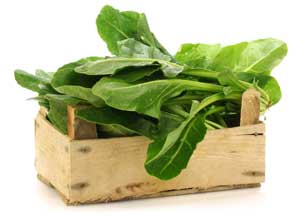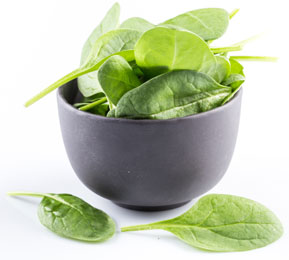





1. Spinach Facts
2. Types of Spinach
3. Spinach Nutritional value
4. Spinach Health Benefits
English or common spinach (Spinacia oleracea) is a vegetable from the Amaranthaceae family. A very nutritious plant know for its edible leaves.
Spinach was the favourite vegetable of Catherine de Medici, an historical figure in the 16th century. When she left her home of Florence, Italy, to marry the king of France, she brought along her own cooks, who could prepare spinach the way she especially liked. Since this time, dishes prepared on a bed of spinach have been referred to as "a la Florentine" in her honour.
The French term "a la florentine" in recipes indicates that the recipe has spinach as a major ingredient.
A little spinach trivia, it is believed that Spinach has long been linked to prosperity. Eat spinach and increase your chances of making more money!
History and Origin
It is believed that spinach was a wild edible green plant found in ancient Persia (Iran).
Research indicates that in 647 AD spinach was introduced to China where it was referred to as the “Persian green.”
Spinach was introduced by the Moors of North Africa to Spain in the 11th century.
By the Middle Ages, spinach was grown and sold throughout the rest of Europe, and in England was known as the “Spanish vegetable.” It was not until the 1400’s that spinach became a staple in Mediterranean cooking.
Research indicates that spinach, which does not grow well in hot weather, was successfully cultivated in the hot and arid Mediterranean climate by Arab agronomists through the use of sophisticated irrigation techniques as early as the eighth century A.D.
- • English or common spinach
- • Silverbeet or Swiss chard
- • French spinach or orach
- • New Zealand spinach
- • Chinese spinach
- • Indian spinach
- • Savoy spinach
- • Smooth-Leaf spinach
- • Semi-savoy spinach
The main types of spinach grown and sold in Australia are baby leaf, savoy, and smooth-leaf, with specific varieties like 'Winter Giant' and 'Bloomsdale Long Standing' also popular. Baby spinach is known for its tender leaves and quick growth, savoy for its crinkled, cold-hardy leaves, and smooth-leaf for its flat, easier-to-clean leaves, which are ideal for salads.
Types of spinach
English spinach Spinacia oleracea (common spinach): A fast-growing leafy green that thrives in cooler weather and is prized for its mild, slightly sweet flavour. It is often confused with silverbeet but can be distinguished by its oval leaves and edible green stems. It is a nutritional powerhouse, rich in vitamins and iron, and can be eaten raw in salads or cooked.
Baby Spinach: A quick-growing, tender variety that is perfect for fresh salads and other dishes.
Savoy Spinach: Characterised by its crinkly, dark green leaves. It is highly resistant to cold weather and has a slightly sweet flavour.
Smooth-Leaf Spinach: Features flat, smooth leaves that are easier to clean compared to savoy types and are excellent for fresh salads.
Semi-Savoy Spinach: A hybrid that combines the best traits of both savoy and smooth-leaf spinach.
Swiss chard and silverbeet are the same plant, with the name "silverbeet" being more common in Australia and New Zealand, while "Swiss chard" is more common in the UK and North America. The difference often comes down to regional terminology; however, "Swiss chard" is also used as an umbrella term that includes varieties with colourful stems, such as "rainbow chard" and "red chard".
French spinach is another name for orach, an edible plant with a similar flavour and texture to spinach but with greater heat tolerance. It is often called "mountain spinach" and is used raw in salads or cooked like traditional spinach.
Chinese spinach is not a true spinach but a type of amaranth, scientifically known as Amaranthus dubius. It is a heat-tolerant leafy green, often with vibrant red and green leaves, that is popular in Asian cuisine and prepared similarly to regular spinach through methods like stir-frying or steaming.
New Zealand spinach (T𝑒𝑡𝑟𝑎𝑔𝑜𝑛𝑖𝑎 T𝑒𝑡𝑟𝑎𝑔𝑜𝑛𝑖𝑜𝑖𝑑𝑒𝑠) is a heat-tolerant leafy green also called warrigal greens, which grows as a sprawling ground cover. It is a popular summer substitute for traditional spinach because it doesn't bolt in hot weather. Its fleshy, triangular leaves have a "blistered" or shimmering appearance due to tiny, water-storing bladders and can be used raw in salads or cooked.
Indian spinach is most commonly Malabar spinach (Basella alba), a heat-loving, climbing vine native to tropical Asia, which is a popular leafy green in Indian cuisine. It is not a true spinach but is a versatile substitute that thrives in warm weather, has thick, glossy leaves that can be used raw or cooked, and is known for its high nutritional content.
Popular varieties
Winter Giant: A cold-hardy variety with large, crinkly, dark green leaves, ideal for overwintering crops.
Bloomsdale Long Standing: A classic heirloom with deeply crinkled leaves and a rich, earthy taste. It is a reliable, heavy-producing variety that is good for multiple harvests.
Vegetables " Spinach "
Nutritional value per 100 g
Spinach, cooked, boiled, drained, without salt
|
Nutrient (Proximity)
|
Unit
|
Value
|
Daily Value %
|
|
Energy
|
kcal
|
23 | 1.1% |
|
Protein
|
g
|
2.97 | 5.9% |
|
Total lipid (fat)
|
g
|
0.26 | 0.3% |
|
Carbohydrate, by difference
|
g
|
3.75 | 1.3% |
|
Fiber, total dietary
|
g
|
2.4 | 8.5% |
|
Sugars, total
|
g
|
0.43
|
|
|
Minerals
|
|||
|
Calcium, Ca
|
mg
|
136 | 10.4% |
|
Iron, Fe
|
mg
|
3.57 | 19.8% |
|
Magnesium, Mg
|
mg
|
87 | 20.7% |
|
Phosphorus, P
|
mg
|
56 | 4.4% |
|
Potassium, K
|
mg
|
466 | 9.9% |
|
Sodium, Na
|
mg
|
70 | 3% |
|
Zinc, Zn
|
mg
|
0.76 | 6.9% |
|
Copper, Cu
|
mg
|
0.174 | 19.3% |
|
Manganese, Mn
|
mg
|
0.935 | 40.6% |
|
Selenium, Se
|
mcg
|
1.5 | 2.7% |
|
Vitamins
|
|||
|
Vitamin C, total ascorbic acid
|
mg
|
9.8 | 10.8% |
|
Thiamin (B-1)
|
mg
|
0.095 | 7.9% |
|
Riboflavin (B-2)
|
mg
|
0.236 | 18.1% |
|
Niacin (B-3)
|
mg
|
0.490 | 3% |
|
Pantothenic acid (B-5)
|
mg
|
0.145 | 2.9% |
|
Vitamin B-6
|
mg
|
0.242 | 14.2% |
|
Folate, total (B-9)
|
mcg
|
146 | 36.5% |
|
Vitamin B-12
|
mcg
|
0.00
|
|
|
Vitamin A, RAE
|
mcg
|
524 | 58.2% |
|
Vitamin E (alpha-tocopherol)
|
mg
|
2.08 | 13.8% |
|
Vitamin D (D2 + D3)
|
mcg
|
0
|
|
|
Vitamin K (phylloquinone)
|
mcg
|
493.6 | 411.3% |
|
Lipids
|
|||
|
Saturated Fatty Acids
|
g
|
0.043
|
0.2% |
|
Monounsaturated Fatty Acids
|
g
|
0.006
|
|
|
Polyunsaturated Fatty Acids
|
g
|
0.109
|
|
|
Trans Fatty Acids
|
g
|
0.000
|
|
|
Carotenoids
|
|||
|
Beta-Carotene
|
mcg
|
6288
|
|
|
Alpha-Carotene
|
mcg
|
||
|
Beta-Cryptoxanthin
|
mcg
|
||
|
Lutein + zeaxanthin
|
mcg
|
11308
|
|

|
Reference Values are based on a 2,000 Calorie Intake, for Adults and Children 4 or More Years of Age. Your daily values may be higher or lower depending on your calorie needs.
|
|
Percentages are roughly approximated using (RDA) Recommended Dietary Allowances for adults. Source: Nutrient Database - USDA (United States Department of Agriculture)
|
|
Reference Values for Nutrition - FDA U.S. Food and Drug Administration
|
Spinach Nutritional Value
|
Spinach is one of the worlds most nutritious vegetables. Spinach is an excellent source of many vitamins, minerals and antioxidants. A vegetable that truly packs a punch with essential nutrients.
|
|
A nutrient rich plant, spinach is commonly found on lists of top super foods. Super foods are nutrient-rich foods considered to be especially beneficial for health and well-being.
|
Spinach offers numerous health benefits, including promoting heart health by lowering blood pressure and providing potassium, supporting eye health through lutein and zeaxanthin, and aiding digestion with its fiber content. It is also rich in vitamins and minerals like Vitamin K, Vitamin A, and iron, which support strong bones, healthy skin, and energy levels, while its antioxidants help reduce oxidative stress and may protect against chronic diseases like cancer.
Spinach has an extremely high nutritional value and is rich in antioxidants. It is a good source of vitamins A, B2, C and K, and also contains magnesium, manganese, folate, iron, calcium and potassium.
Add Spinach to your diet to aid detoxification, maintain bone health and muscles, reduce inflammation, maintain a healthy heart, treat anaemia, help prevent cancer, improve digestion, improve skin and eyes, lower blood pressure and aid with weight management.
Epidemiological studies and associated meta-analyses strongly suggest that long term consumption of diets rich in plant polyphenols offer protection against development of cancers, cardiovascular diseases, diabetes, osteoporosis and neurodegenerative diseases.
Calorie for calorie, spinach is one of the most nutritious vegetables around. It is not only rich in vitamins and minerals but in phytonutrients, which act as powerful antioxidants to protect cellular structures and DNA.
- SKIN AND HAIR HEALTH
Spinach benefits skin and hair health through its rich content of vitamins A and C, iron, and antioxidants. It promotes skin hydration and collagen production, fights signs of aging, and strengthens hair follicles, which can reduce hair loss and improve its shine and texture. - EYE HEALTH
Spinach supports eye health because it's rich in the antioxidant’s lutein and zeaxanthin, which protect the eyes from damaging light and reduce the risk of age-related eye diseases like cataracts and macular degeneration. It also contains vitamin A, which is crucial for vision, and other eye-friendly nutrients like vitamin C and E. - DIGESTIVE HEALTH
Spinach supports digestive health by providing fiber, which aids in regular bowel movements and prevents constipation. It also contains nutrients that promote a healthy gut microbiome and anti-inflammatory compounds that reduce irritation in the digestive tract. However, consuming too much can cause digestive discomfort for some, and individuals with histamine intolerance or kidney stones risk may need to limit their intake. - SUPPORTS IMMUNE SYSTEM
Spinach supports the immune system by being rich in vitamins A, C, and E, as well as antioxidants like beta-carotene. Vitamin C boosts the production of infection-fighting white blood cells, while antioxidants help protect cells from damage. Eating spinach, whether raw or lightly cooked, helps provide these essential nutrients that are vital for a strong immune response. - BENEFITS BONE HEALTH
Spinach benefits bone health by providing vitamin K and calcium, but its high oxalate content hinders calcium absorption, making it less effective for bone health compared to other greens like broccoli or collard greens. Therefore, while spinach is nutrient-rich overall, it's not a top choice for a calcium-focused diet for strong bones, and focusing on low-oxalate alternatives is better for increasing calcium intake.

- HEART HEALTH
Spinach benefits heart health by lowering blood pressure through potassium and nitrates, which improve blood flow, and by reducing cholesterol via its fiber content. It is rich in antioxidants, vitamins (like K and C), and minerals (like magnesium) that protect against heart disease and reduce inflammation. Consuming just one cup of leafy greens like spinach daily can significantly lower the risk of heart disease. - HIGH IN VITAMINS
Spinach is high in vitamins A, C, and K, as well as iron, magnesium, folate, and other antioxidants. This nutrient-dense vegetable is known to support bone, eye, and immune health and can aid digestion. However, people on blood thinners should consult a doctor, as the high vitamin K content can interfere with certain medications. - GOOD SOURCE OF MINERALS
Spinach is a good source of minerals like iron, calcium, magnesium, and potassium. It is particularly rich in iron, which is crucial for carrying oxygen in the blood, and magnesium, which supports muscle and nerve function. The mineral content in spinach helps maintain overall health, including supporting immune function, bone health, and muscle efficiency. - RICH IN PLANT COMPOUNDS
Spinach is rich in plant compounds, including antioxidants like lutein, zeaxanthin, and kaempferol, which help combat oxidative stress. It also contains polyphenols and flavonoids that may have protective properties, and nitrates that support cardiovascular health. Additionally, spinach provides pigments such as chlorophyll and carotenoids. - IRON ABSORPTION
Spinach iron absorption is limited because it contains non-heme iron, which is poorly absorbed, and high levels of oxalic acid that binds to and blocks the iron. To improve absorption, cook the spinach to reduce oxalate levels and pair it with vitamin C-rich foods, while avoiding consumption with calcium or tea, as these can further inhibit absorption.
References
Nutrient Database - USDA (United States Department of Agriculture)
Reference Values for Nutrition - FDA U.S. Food and Drug Administration
Heart health - Spinach benefits heart health by lowering blood pressure through potassium and nitrates, which improve blood flow, and by reducing cholesterol via its fiber content. It is rich in antioxidants, vitamins (like K and C), and minerals (like magnesium) that protect against heart disease and reduce inflammation. Consuming just one cup of leafy greens like spinach daily can significantly lower the risk of heart disease.
Eye health - Spinach supports eye health because it's rich in the antioxidant’s lutein and zeaxanthin, which protect the eyes from damaging light and reduce the risk of age-related eye diseases like cataracts and macular degeneration. It also contains vitamin A, which is crucial for vision, and other eye-friendly nutrients like vitamin C and E.
Digestive health - Spinach supports digestive health by providing fiber, which aids in regular bowel movements and prevents constipation. It also contains nutrients that promote a healthy gut microbiome and anti-inflammatory compounds that reduce irritation in the digestive tract. However, consuming too much can cause digestive discomfort for some, and individuals with histamine intolerance or kidney stones risk may need to limit their intake.
Bone health - Spinach benefits bone health by providing vitamin K and calcium, but its high oxalate content hinders calcium absorption, making it less effective for bone health compared to other greens like broccoli or collard greens. Therefore, while spinach is nutrient-rich overall, it's not a top choice for a calcium-focused diet for strong bones, and focusing on low-oxalate alternatives is better for increasing calcium intake.
Skin and hair health - Spinach benefits skin and hair health through its rich content of vitamins A and C, iron, and antioxidants. It promotes skin hydration and collagen production, fights signs of aging, and strengthens hair follicles, which can reduce hair loss and improve its shine and texture.
High in vitamins - Spinach is high in vitamins A, C, and K, as well as iron, magnesium, folate, and other antioxidants. This nutrient-dense vegetable is known to support bone, eye, and immune health and can aid digestion. However, people on blood thinners should consult a doctor, as the high vitamin K content can interfere with certain medications.
Good source of minerals - Spinach is a good source of minerals like iron, calcium, magnesium, and potassium. It is particularly rich in iron, which is crucial for carrying oxygen in the blood, and magnesium, which supports muscle and nerve function. The mineral content in spinach helps maintain overall health, including supporting immune function, bone health, and muscle efficiency.
Rich in plant compounds - Spinach is rich in plant compounds, including antioxidants like lutein, zeaxanthin, and kaempferol, which help combat oxidative stress. It also contains polyphenols and flavonoids that may have protective properties, and nitrates that support cardiovascular health. Additionally, spinach provides pigments such as chlorophyll and carotenoids.
Iron absorption - Spinach iron absorption is limited because it contains non-heme iron, which is poorly absorbed, and high levels of oxalic acid that binds to and blocks the iron. To improve absorption, cook the spinach to reduce oxalate levels and pair it with vitamin C-rich foods, while avoiding consumption with calcium or tea, as these can further inhibit absorption.
Diabetes management (Spinach contains the antioxidant alpha-lipoic acid (ALA), which may help manage diabetes by lowering blood sugar, increasing insulin sensitivity, and reducing oxidative stress). ALA may also help with diabetic neuropathy symptoms, but more research is needed to confirm these benefits in humans, especially when taken as a supplement.
Eating a diet rich in fruits and vegetables may help reduce the severity of asthma symptoms and lessen the risk of attacks. Antioxidants, such as vitamin C, vitamin E, and beta carotene, may all assist lung function, and spinach contains all three. Learn more about asthma and diet.
Spinach helps keep the heart healthy (primarily because of its high potassium content, which helps to lower blood pressure by reducing the effects of sodium in the body and by helping to relax blood vessel walls). A diet rich in potassium from foods like spinach can help manage or lower high blood pressure, a significant risk factor for heart disease.
Spinach is excellent for eye, skin, and hair health (due to its high levels of lutein and zeaxanthin, which protect the macula and can delay age-related eye conditions). The vitamin C in spinach supports collagen production for healthy skin and hair, while vitamin A is essential for vision and skin renewal.
Spinach offers antioxidant benefits through its Vitamin A (from carotenoids), Vitamin C, and Vitamin E content, which protect cells from damage caused by free radicals. These vitamins contribute to a range of health benefits, including supporting immune function, maintaining healthy vision and skin, and reducing the risk of chronic diseases like certain cancers and age-related macular degeneration.
Improves bone health (Yes, spinach improves bone health because it is rich in Vitamin K, a nutrient essential for bone formation and maintenance). Spinach helps the body produce osteocalcin, a protein that improves bone density and toughness. Increased intake of vitamin K from leafy greens like spinach has been linked to a reduced risk of bone fractures.
Blood Pressure lowering (Spinach helps lower blood pressure due to its high potassium content, which helps the body excrete excess sodium and water, thereby relaxing blood vessel walls). The potassium in spinach counteracts the negative effects of high-sodium diets, which are a risk factor for high blood pressure. Additionally, spinach contains nitrates and magnesium, which further support healthy blood pressure levels by helping to produce nitric oxide, a molecule that expands blood vessels.
Spinach promotes regularity (because it is rich in both insoluble fiber and water). The fiber adds bulk to stool, making it easier to pass, while the water helps to keep it soft and move through the digestive system. Together, these components prevent constipation and promote a healthy, regular digestive tract.
Cancer prevention (Spinach and Health: Anticancer Effect). Spinach A Superpower Against Colon Cancer.
Spinach contains a good amount of non-heme iron, a type of iron the body absorbs less efficiently than the heme iron found in meat. While the high content of polyphenols in spinach can inhibit iron absorption, consuming spinach with Vitamin C-rich foods (like bell peppers or citrus) or healthy fats can significantly improve how much iron your body absorbs. Therefore, while not as high in iron as meat, spinach remains a valuable part of a diet for preventing iron deficiency, especially when paired with iron-absorption enhancers.
Iron Deficiency (spinach contains a good amount of non-heme iron, a type of iron the body absorbs less efficiently than the heme iron found in meat). While the high content of polyphenols in spinach can inhibit iron absorption, consuming spinach with Vitamin C-rich foods (like bell peppers or citrus) or healthy fats can significantly improve how much iron your body absorbs. Therefore, while not as high in iron as meat, spinach remains a valuable part of a diet for preventing iron deficiency, especially when paired with iron-absorption enhancers.
Spinach is indeed a rich source of Vitamin K (This vitamin is essential for blood clotting and bone health). However, the absorption rate of Vitamin K from spinach is lower than from a supplement or oil because it is tightly bound within the plant's cells. Consuming spinach with a small amount of fat can improve absorption, but for most people, the health benefits of this low-calorie, low-fat vegetable are excellent.
Induced asthma by a natural isomer mixture of beta-carotene
Spinach - Blood Pressure Lowering – Studies 1 2 3 (Spinach helps lower blood pressure due to its high potassium and nitrate content). Potassium helps the body get rid of excess sodium, which can raise blood pressure, while nitrates are converted to nitric oxide, a compound that relaxes blood vessels. Studies have shown that consuming spinach can effectively lower blood pressure and improve heart health.
Important considerations
Blood thinners: If you are taking blood thinners like warfarin, it's important to maintain a consistent intake of vitamin K and talk to your doctor before making significant dietary changes.
